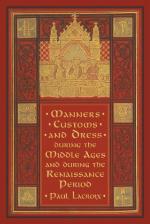Servitude was in fact to be found in all conditions and ranks, equally in the palace of the sovereign as in the dwellings of his subjects. The vassal who was waited on at his own table by a varlet, himself served at the table of his lord; the nobles treated each other likewise, according to their rank; and all the exactions which each submitted to from his superiors, and required to be paid to him by those below him, were looked upon not as onerous duties, but as rights and honours. The sentiment of dignity and of personal independence, which has become, so to say, the soul of modern society, did not exist at all, or at least but very slightly, amongst the Germans. If we could doubt the fact, we have but to remember that these men, so proud, so indifferent to suffering or death, would often think little of staking their liberty in gambling, in the hope that if successful their gain might afford them the means of gratifying some brutal passion.
[Illustration: Fig. 6.—King or Chief of Franks armed with the Seramasax, from a Miniature of the Ninth Century, drawn by H. de Vielcastel.]
When the Franks took root in Gaul, their dress and institutions were adopted by the Roman society (Fig. 6). This had the most disastrous influence in every point of view, and it is easy to prove that civilisation did not emerge from this chaos until by degrees the Teutonic spirit disappeared from the world. As long as this spirit reigned, neither private nor public liberty existed. Individual patriotism only extended as far as the border of a man’s family, and the nation became broken up into clans. Gaul soon found itself parcelled off into domains which were almost independent of one another. It was thus that Germanic genius became developed.
[Illustration: Fig. 7.—The King of the Franks, in the midst of the Military Chiefs who formed his Treuste, or armed Court, dictates the Salic Law (Code of the Barbaric Laws).—Fac-simile of a Miniature in the “Chronicles of St. Denis,” a Manuscript of the Fourteenth Century (Library of the Arsenal).]
The advantages of acting together for mutual protection first established itself in families. If any one suffered from an act of violence, he laid the matter before his relatives for them jointly to seek reparation. The question was then settled between the families of the offended person and the offender, all of whom were equally associated in the object of vindicating a cause which interested them alone, without recognising any established authority, and without appealing to the law. If the parties had sought the protection or advice of men of power, the quarrel might at once take a wider scope, and tend to kindle a feud between two nobles. In any case the King only interfered when the safety of his person or the interests of his dominions were threatened.
Penalties and punishments were almost always to be averted by a money payment. A son, for instance, instead of avenging the death of his father, received from the murderer a certain indemnity in specie, according to legal tariff; and the law was thus satisfied.




